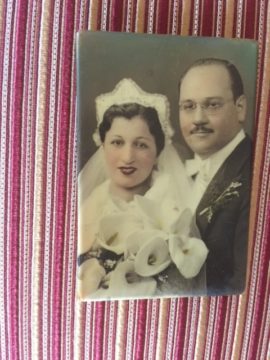by Evert Cilliers (aka Adam Ash) 
Five weeks ago I said to my brilliant girlfriend: “I'd like to see my father before he dies.” She said: “Congratulations.” She'd been asking me on and off for two years whether I'd like to go and visit him where he lives in Cape Town, South Africa, and my stock answer had always been: “I don't have the slightest interest in ever seeing my father again.”
So what changed?
You here at 3quarksdaily know me as a passionate ranter against our irresponsible elites (for my favorite screed ever, google this title: “Government Is Not The Problem, Private Enterprise Is: The Global Terrorism Of Al Qaeda, BP And Goldman Sachs”). However, that's not what I'm up to now. This time out, I'm autobiographical. Personal. Self-revelatory. Unbuttoned. A la Moll Flanders. Or Paris Hilton. Confessions of an Opium Eater or something, at double the length of my usual rants.
I made the big Gauguin move of my life two decades ago, when I walked out on my South African Jewish Princess wife in our seven-room, three-bathroom apartment on the Upper West Side of Manhattan. Except I didn't go to Tahiti. I went to a garret on Manhattan's Lower East Side. For fifteen years, while I was poor and wrote, wrote, wrote my seven unpublished novels (and became the 90s slam poet Evert Eden), my ex-wife and I didn't communicate. Then, out of the blue, I got a call from her.
“I'd like to see you,” she said.
“Why?” I asked.
“I'm dying.”
She always had a way of knocking the wind out of my sails. This time the issue was galloping cancer in her stomach.
I went to hang out with her and her brother and her sister during her last days on earth, in that big, elegant apartment, now sans my large paintings, but filled with South African art, a shrine to our homeland.
“I've got no charge with you anymore,” she informed me, in the magnanimous version of her imperial Jewish Princess voice. I thought, “fuck you,” but I just nodded.
Two days before she died, throwing up her guts in a gush of blood and stuff, my ex-wife lay propped up in her bedroom with me on the side of her beautiful bed, designed to her specifications, as was everything and everyone around her. Her doctor brother had been slamming her with as many drugs as he could to keep her semi-comfortable but still lucid.
The two of us were sitting alone, the very ex-married couple. She said:
“How can this be happening to me, when I've always tried to be so good?”
“It's fate,” I said. “We can't control what happens, just how we deal with it.”
It's amazing how one pulls out the most boring cliches at the best and worst of times. My ex-wife suddenly got up and walked to the bathroom, which had always been her bathroom when we lived together; I used the bathroom one room over. As she walked, trailing a sheet behind her, she said in the commanding version of her imperial Jewish Princess voice:
“Make the bed.”
I stood there, looking at the huge mess of sheets and blankets, caught like the proverbial husband in habitual male learned helplessness.
“How?” I asked.
Without losing a beat, and without even looking at me, she snapped:
“Military style.”
The door of the bathroom closed behind her. And I made that goddamn bed that she and I had spent ten years in, that I hadn't seen in fifteen years, and General Patton himself would've approved.
Read more »

